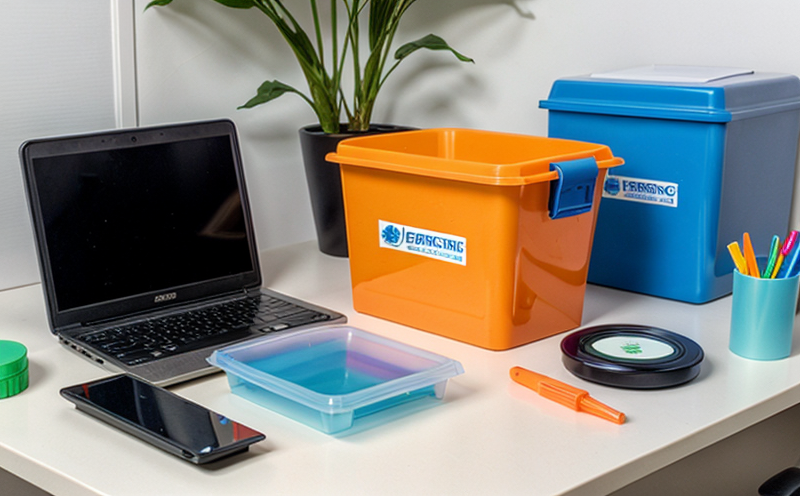DIN EN 14806 Compostability Testing of Plastic Stationery
The DIN EN 14806 standard provides a framework for assessing the biodegradability and compostability of plastic materials under industrial composting conditions. This test is critical for ensuring that plastic stationery items, such as pens, folders, and rulers, can break down into benign substances without leaving harmful residues in the environment.
This testing procedure evaluates whether the material meets specific criteria regarding disintegration, biodegradation, and absence of toxic substances after a defined period under industrial composting conditions. The test involves placing specimens in controlled composting environments to observe their decomposition over time.
The standard is particularly relevant for manufacturers aiming to meet regulatory requirements or sustainability goals. Compliance with DIN EN 14806 can enhance the reputation of brands committed to environmental responsibility and sustainable practices. Additionally, it opens up market opportunities in regions where there are stringent regulations regarding waste management and recycling.
For R&D engineers, this test provides critical data on material performance under specific conditions. Understanding how different plastics behave in composting environments allows for the development of more sustainable products. For quality managers and compliance officers, ensuring product compliance with such standards is essential to avoid legal issues and maintain a positive brand image.
The testing process involves several steps: selection of appropriate specimens, preparation of test samples according to standard procedures, exposure to industrial composting conditions, observation of biodegradation processes, and analysis of the results. Compliance engineers can leverage this information to refine product formulas and manufacturing processes.
Testing instruments used in this process include incubators for maintaining consistent temperature during the composting period, analytical balances for accurate weight measurement before and after testing, and visual inspection tools to assess disintegration levels. Reporting involves detailed documentation of test conditions, observed changes over time, and conclusions regarding compliance with DIN EN 14806.
Understanding the nuances of this standard is crucial for brands looking to differentiate themselves in a crowded market. By focusing on sustainable materials and processes, companies can appeal to eco-conscious consumers who value environmentally friendly products.
Benefits
Complying with DIN EN 14806 offers numerous benefits for manufacturers of plastic stationery. These include:
- Enhanced Environmental Reputation: Meeting this standard demonstrates a commitment to sustainability, which can significantly enhance the brand’s image.
- Regulatory Compliance: Ensures that products meet legal requirements in various regions where such standards are enforced.
- Market Access: Opening up opportunities for exporting products to markets with stringent environmental regulations.
- Innovation Opportunities: Encourages R&D efforts towards developing more sustainable materials and technologies.
The standard also provides a clear framework for product development, ensuring that new formulations are tested against established criteria before being introduced to the market. This reduces the risk of non-compliance issues down the line and ensures consistent quality across all products.
For procurement teams, this compliance can lead to better sourcing decisions by identifying suppliers who meet stringent environmental standards. It also supports long-term business strategies focused on sustainability and corporate social responsibility (CSR).
Environmental and Sustainability Contributions
- Reduction in Landfill Waste: By ensuring that plastic stationery can decompose under industrial composting conditions, the standard helps reduce the amount of non-biodegradable waste sent to landfills.
- Sustainable Resource Use: Encourages the use of biodegradable and renewable resources in manufacturing processes.
- Better Air Quality: Reducing plastic waste that remains intact over long periods can lead to improved air quality by minimizing the release of harmful substances into the atmosphere.
- Support for Circular Economy: Facilitates the transition towards a more circular economy where resources are reused and recycled rather than discarded.
The standard plays a vital role in promoting sustainable practices within the industry. By fostering innovation and encouraging environmentally friendly manufacturing processes, it contributes to broader environmental goals such as reducing carbon footprints and conserving natural resources.
Competitive Advantage and Market Impact
Meeting DIN EN 14806 can provide significant competitive advantages for manufacturers in the office and stationery sector. In a marketplace increasingly focused on sustainability, compliance with this standard can set brands apart from competitors who do not meet such stringent criteria.
Consumers are becoming more aware of environmental issues and are often willing to pay premium prices for products that align with their values. By offering eco-friendly plastic stationery options, manufacturers can attract these environmentally conscious customers, thereby enhancing customer loyalty and satisfaction.
The standard also opens up new market opportunities by allowing companies to enter regions where there are specific regulations regarding waste management and recycling. This expansion into international markets can lead to increased sales and revenue growth.
Moreover, compliance with DIN EN 14806 signals a commitment to corporate social responsibility (CSR), which is increasingly important for attracting investors who look favorably upon companies that contribute positively to society and the environment.





